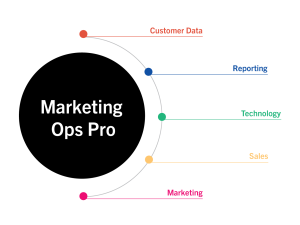What is Marketing Operations?
Marketing Operations (MOps) encompasses the organizational functions of aligning marketing activities with strategic business objectives, planning and overseeing marketing campaigns, reporting and data analytics, managing brand compliance, and optimizing people, processes, and technology, and integrations to drive revenue and business success.

While traditional marketers focus on leveraging their creativity and insight to design and build campaigns that resonate with the target audience, marketing operations professionals utilize skills like project management, data analytics, market research, and systems optimization to help drive marketing success.
In modern SaaS businesses (and other large organizations), Marketing Operations exists as an individual, department, or a Revenue Operations agency who oversees marketing activities, ensures alignment with strategic business objectives, and allocates resources to maximize success based on KPIs that connect directly to revenue.
What is Marketing Ops vs Traditional Marketing?
If you’ve never heard the term “Marketing Operations”, you might be wondering about the difference between Marketing Ops and just plain “Marketing”.
As we all know, marketing includes the actions taken by an organization to increase awareness and generate demand for its products and services. Marketing Ops complements these efforts by ensuring they are strategically aligned with business objectives and branding, choosing the right tools and technologies to support success, planning and overseeing campaigns, and collecting data-driven insights to inform strategic decision-making.
While marketers do much of the tactical work when it comes to increasing brand awareness and driving demand, Marketing Operations focuses higher-level strategic activities that help ensure the success of the marketing organization.
Why is Marketing Operations Important?
In the past, traditional marketing methods like print and billboard advertising made it difficult to quantify and correctly attribute marketing results. As a result, marketing was seen as a creative and intuitive practice where success was defined by eye-catching campaigns or an unforgettable jingle.
Today, marketing teams enjoy unprecedented access to data that empowers organizations to better understand their customers, craft targeted campaigns and messaging to reach those customers, correctly attribute marketing results to a specific campaign or touchpoint, and measure results to assess marketing ROI.
The Marketing Operations role was created to manage the strategic and analytical functions within the marketing department, maximize the value of marketing data and technology investments, align sales and marketing with revenue-generation goals, and direct the entire marketing team towards activities with the greatest anticipated ROI.
What Does a Marketing Operations Team Do?
Let’s take a closer look at some of the core functions assigned to Marketing Operations teams or professionals in modern organizations.
Strategic revenue alignment
Marketing Operations works to ensure strategic alignment between the activities of the marketing department and the strategic objectives of the business.
To achieve this, MOps communicate to bridge gaps between product development, marketing, and sales teams within the organization. MOps helps to ensure that marketing activities are focused on elevating KPIs that connect directly to revenue and overall business success.
Brand building and consistency
Modern organizations can execute a number of marketing campaigns or plays simultaneously to increase brand awareness and drive demand. Another function of MOps is to develop the organization’s brand, ensure consistency in the deployment of brand assets, and deliver a coherent brand experience across marketing campaigns and touchpoints.
MarTech investments and integrations
Organizations in 2021 have more choice than ever when it comes to selecting marketing technologies to support their business objectives. The barrier to adoption for these tools is often low, but using too many of the wrong ones can consume valuable resources without effectively driving ROI.
In modern marketing departments, Marketing Operations teams take responsibility for choosing the right MartTech investments and integrating them effectively into marketing workflows to support the organization’s business objectives and overall strategy.
High level project planning
Marketing Operations uses data-driven insights to plan marketing projects and campaigns that meet the strategic needs of the organization and reflect the latest data-driven insights on customer behaviors and preferences. While Marketing Ops delivers a high-level project plan for success, a marketing manager or coordinator is typically responsible for building, delivering, and day-to-day management of projects and campaigns.
Process management and optimization
As part of the broad oversight and governance of the marketing department, Marketing Operations is often responsible for managing and optimizing marketing-related processes. This broad function includes optimizing workflows between marketing and sales, implementing lead-scoring and other initiatives to manage lead quality, streamlining reports and other feedback mechanisms, and more.
Data enrichment and reporting
Marketing Ops are the number crunchers within the marketing department, with responsibility for managing marketing data, reporting the results of campaigns and projects, and generating data-driven customer insights to support future strategic planning and drive revenue.
MOPs may also enrich data by pooling it from multiple sources to generate even deeper insights into an organization’s audiences, customers, and the success of its marketing activities.
The Future of Marketing Operations in 2021
With the first formal MOps education delivered as recently as 2008, Marketing Operations is a relatively new function that’s becoming increasingly important to the success of modern marketing teams.
The future of Marketing Operations is Customer-Led Marketing Ops, a new approach that emphasizes the need to improve customer experiences and drive SQLs/revenue generation across marketing touchpoints.
Check out our resource on customer-led MOps for a closer look at how Customer-Led Marketing Operations is helping SaaS technology businesses reach their SQL and revenue goals.